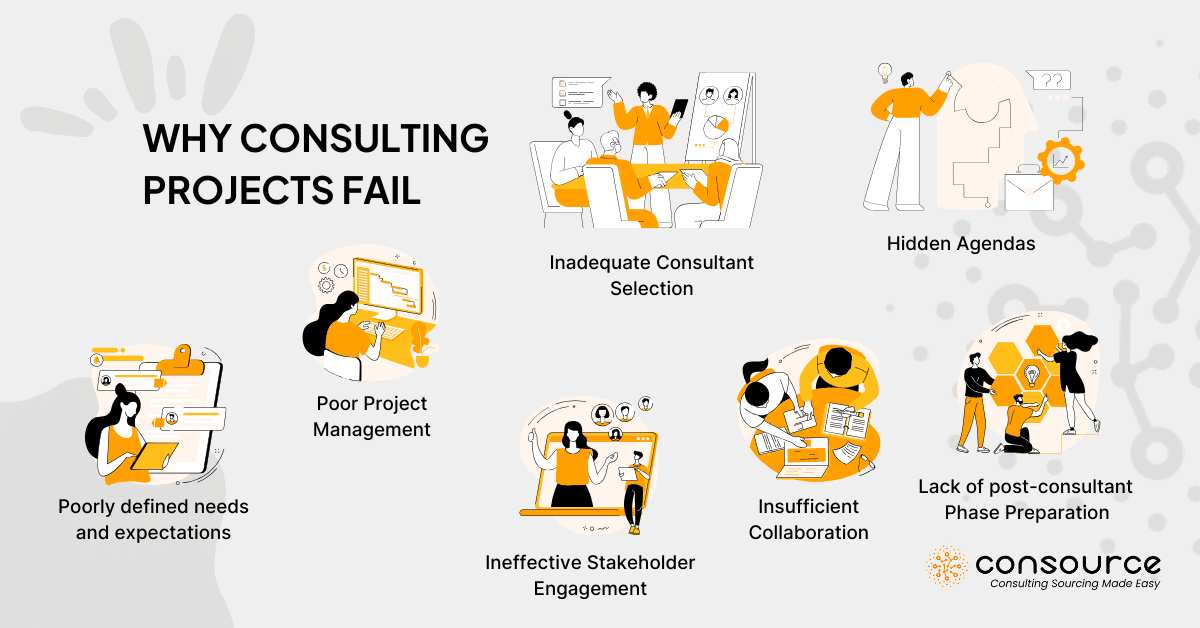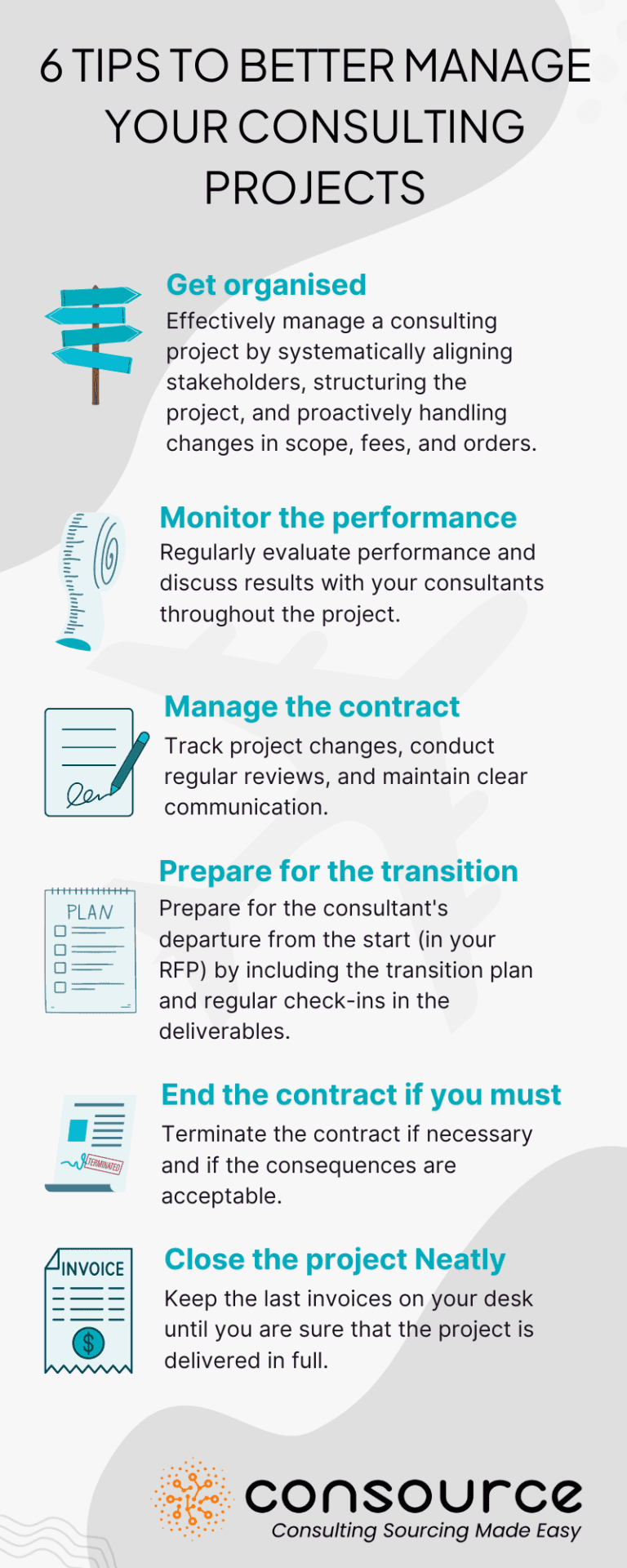Efficiently managing consulting projects is crucial in today’s dynamic business landscape. These complex and multifaceted projects demand precise coordination, clear communication, and a strategic approach.
Mismanagement can lead to missed deadlines, budget overruns, and unmet expectations, significantly undermining an organisation’s strategic goals. Understanding these challenges is the first step towards ensuring the successful delivery of consulting projects, maximising both client satisfaction and project outcomes.
Understanding Why Consulting Projects Fail
Grasping why consulting projects falter is crucial to steering clear of common pitfalls and ensuring project success. The most prevalent reasons for failure involve a mix of poor planning, inadequate engagement, and unsuitable management practices:
Poorly Defined Needs and Expectations
Unclear project objectives are a significant pitfall. When goals are vague or ambiguous, it results in confusion and misalignment across the project team. Establishing clear, realistic objectives is crucial for guiding the project and measuring its success. Additionally, setting specific deliverables and timelines from the start provides essential structure and accountability, preventing projects from drifting aimlessly and ensuring all team members remain on track.
Ineffective Stakeholder Engagement
Proper engagement is vital for any project’s success. When key stakeholders are not adequately identified and involved from the outset, projects often suffer from insufficient support and collaboration, undermining their potential. Effective communication is critical here; maintaining open lines of dialogue prevents misunderstandings and keeps expectations aligned, which is essential for fostering a cooperative environment and driving the project towards successful outcomes.
Inadequate Consultant Selection
Choosing the right consultant is more than just selecting an expert; it requires aligning consultant capabilities with the project’s unique needs. The right fit is crucial for both skills and organisational culture; a mismatch here can lead to suboptimal results and a disjointed project execution. Tailoring methodologies and strategies to the specific project ensures that the solutions implemented are not only theoretically sound but also practically effective.
Poor Project Management
Strong project management is the backbone of any successful consulting engagement. Without clear governance structures, defined roles and responsibilities, and a steering committee to oversee progress, projects can lack direction and become challenging to manage. Flexibility to adapt to changing circumstances and open feedback channels are also essential for navigating unexpected challenges and preventing cost overruns and delays.

Insufficient Collaboration
Effective collaboration is crucial. When senior management fully engages and commits resources, the project will more likely receive the necessary prioritisation and succeed. Conversely, poor collaboration can slow progress and yield outcomes that fall short of expectations. Promoting teamwork and ensuring all parties work cohesively are essential for achieving the desired results.
Hidden Agendas
Projects can be compromised by the underlying personal goals of leaders that may not align with the broader project objectives. This misalignment can derail a project from its intended path. Promoting transparency and involving stakeholders early in the project planning and consultant selection phases can help mitigate this risk, securing engagement and commitment from all parties involved.
Lack of Post-Consultant Phase Preparation
Frequently overlooked, the transition phase post-consultancy is critical for maintaining the momentum and sustainability of the project’s outcomes. Adequate preparation involves training internal teams to manage new processes or systems without ongoing consultant support. Developing sustainability plans that include regular reviews and updates to the implemented solutions ensures that improvements are maintained long-term.
By proactively addressing these issues, organisations can significantly enhance their project management approaches, thereby increasing the likelihood of success in their consulting endeavours.
Beyond Procurement: Maximising on Consulting Projects
Consulting projects often extend beyond simple procurement issues or consultant qualifications. Success hinges significantly on strategic management and client involvement throughout the project lifecycle.
Scoping: Foundation for Value Creation
Scoping is critical as it lays the foundation for a consulting project, establishing a shared understanding of goals aligned with strategic objectives. Effective scoping ensures all project activities are purpose-driven, integrating clear, measurable expectations that guide every decision and investment. This clarity helps prevent scope creep, manages stakeholder expectations, and maintains focus on strategic goals, ensuring a coherent approach that mitigates the risk of project drift.
By differentiating between essential needs and optional extras, organisations can control costs and focus resources on critical areas with the most significant impact.
Selecting the Right Consultants: Critical for Project Success
The selection of consultants should be based on their ability to deliver real value as defined by the project scope. Key considerations include:
- Industry and Business Understanding: Consultants must have a deep understanding of the client’s industry and specific challenges, ensuring proposed solutions are applicable and tailored to unique needs.
- Proven Track Record: Assessing past success with similar projects is crucial, as it indicates the consultant’s capability to handle project complexities and deliver on commitments.
- Cultural Fit: The consultant’s ability to integrate with the client’s team and align with organisational values is vital for fostering a productive working relationship. This compatibility allows you to work efficiently together and communicate in full transparency, which is essential for project success.
Managing the Project and Change: Ensuring Sustainable Outcomes
Effective project management is essential to keep consulting projects on track and aligned with intended value outcomes. Key strategies include:
- Robust Governance: Implementing strong governance structures similar to those used in internal projects helps bridge potential gaps between consultant and client objectives. Clear roles, responsibilities, and regular progress reviews are essential.
- Adaptive Project Management: Employing flexible strategies to manage risks and respond to project dynamics is crucial. This includes making timely decisions at critical milestones to address any roadblocks and ensure proper resource allocation.
- Change Management: Integrating effective change management practices is critical to ensure the sustainability of project outcomes. This involves engaging all stakeholders strategically, managing resistance through ongoing communication, and transparently discussing the impacts and benefits of changes. Training and workshops can equip the workforce with the necessary skills for new processes or systems, enhancing adaptability and reducing the likelihood of reverting to old practices post-project.
Effective project management and strategic stakeholder engagement ensure the alignment of project outcomes with organisational goals, guaranteeing that the project’s benefits are fully realised and sustained over time.
6 Essential Steps to Manage Your Consulting Projects Successfully
Effective management of consulting projects extends well beyond the initial procurement. These projects demand vigilance, adaptability, and a proactive approach to ensure success. Here are six critical steps:
Get Organized to Manage Your Project
Organising a consulting project involves more than just a kickoff meeting. It requires:
- Stakeholder Alignment: Ensure all stakeholders are on board, understand their roles, and are prepared to collaborate effectively.
- Clear Project Structure: Define roles and responsibilities, establish governance structures, and set up a dual-level management system with a working team for day-to-day management and a steering team for strategic decisions.
- Adaptive Project Changes Management: Develop strategies to efficiently handle scope, fees, and other changes without derailing the project.
- Collaborative Environment: Use centralised platforms for document sharing and communication to ensure transparency and keep all stakeholders engaged. Regular meetings should be held to maintain momentum and address issues swiftly.
Monitor the Performance
Regular and ongoing performance assessments are crucial. Don’t wait until the end of the project to evaluate. Instead, track progress continuously and discuss any issues with the consulting firm to foster collaborative problem-solving and adjustments. This proactive approach helps manage the project effectively and improves overall organisational competence in handling external consultants.
Manage the Consulting Contract
Actively managing the consulting relationship is essential. Regularly review the project scope, staffing, and timeline, and adjust the contract when significant changes occur. Maintaining a record of all changes and conducting formal mid-project reviews can help manage the contract effectively, ensuring alignment with project goals.
Anticipate and Prepare for Consultant’s Departure
From the outset, include a detailed transition plan in your RFP and maintain regular check-ins throughout the project. Prepare for the transfer of knowledge and ensure that internal teams are ready to take over once the consultant departs, safeguarding the sustainability of the project outcomes.
Don’t Hesitate to End the Contract Earlier
Be prepared to terminate the contract early if the project context changes significantly or if continuing as planned is no longer beneficial. Adjusting the project scope or ending the contract early can save resources and direct efforts more effectively where needed.
Close Your Project Neatly
Take a structured approach to project closure. Assess the impact of termination, ensure all deliverables have been met, and the budget is appropriately accounted for. Debrief with the consulting team to review performance and document lessons learned to improve future projects.

How Consource Can Help Enhance Consulting Project Management
Effective management of consulting projects requires an integrated approach that covers planning, execution, and monitoring. Consource offers a specialised platform explicitly designed for the unique challenges of consulting projects, providing comprehensive tools to optimise each phase of the project lifecycle.
End-to-End Project Lifecycle Management with Consource
Consource simplifies the management of consulting projects by integrating Strategy development, RFP creation, contract management, and project execution into a single platform. This unified approach ensures continuity and consistency throughout the project, reducing the risk of errors and speeding up the entire process.
From the outset, use Consource’s suite of tools to manage all project phases. This includes custom templates for scoping, RFPs, and contracts which help in setting clear objectives and expectations.
- On-Demand Expert Advice: Tap into on-demand expert advice available through Consource. This resource is invaluable for navigating complex project challenges and making informed decisions swiftly.
- Stay Updated: Stay updated with the latest trends in consulting through a curated selection of thought leadership materials within Consource, including articles and videos that offer innovative approaches and refine your project management strategies.
Closing Projects Properly with Consource
Proper project closure is essential for ensuring that all deliverables meet the specified quality standards and that financial obligations are settled.
- Verify Deliverables: Use Consource to verify each project deliverable through its comprehensive “Project Management” tab, ensuring that nothing is overlooked and all outcomes meet their expected quality.
- Manage Invoices and Payments: The platform also enables you to manage and track all invoices and payment statuses effectively, which helps in fulfilling financial commitments and avoiding future disputes.
- Assess ROI: Assess the project’s overall impact and return on investment (ROI) using Consource’s “Performance” tab, which offers tools to measure and analyse key performance indicators.
Enhancing Collaboration with Consource
Consource fosters effective collaboration by ensuring the right stakeholders are involved at the correct project stages, aligning the project with organisational goals and maximising resource efficiency.
- Key Stakeholder Involvement: Quickly identify and involve key stakeholders, using Consource’s integrated communication tools and access controls to keep various departments like Strategy, Finance, and IT actively participating in the decision-making process.
- Seamless Involvement: Whether you need insights for vendor selection from Procurement, guidance on contract terms from the Legal team, or IT integration advice, consource facilitates the seamless involvement of these experts, enhancing the project’s quality and viability.
Efficient Project Management with Consource
Managing a consulting project efficiently requires effective communication, streamlined documentation, and proactive performance monitoring. Consource’s Workspace is designed to support these needs comprehensively.
- Centralized Communication and Document Management: Utilize custom chats organised by workstream and a centralised document management system to keep all communications and critical files in one place. This ensures all team members, including consultants, are always up-to-date.
- Task and Milestone Tracking: Efficiently manage tasks, set up meetings, track changes to the project scope, and monitor all critical project orders and milestones within the platform. This centralised tracking helps keep the project on its intended timeline and promptly address any deviations.
By leveraging Consource, organisations can ensure their consulting projects are managed with high levels of governance and control while maintaining the flexibility needed to adapt to project dynamics and stakeholder needs. Consource not only streamlines the management process but also enhances the effectiveness and outcomes of consulting projects.
Improve the way your manage your consulting projects with our ebook
Are you ready to transform the management of your consulting projects? Download our eBook and comprehensive project management checklist for more detailed guidance. These resources provide valuable insights into each project lifecycle phase, ensuring you have all the tools necessary to manage your projects effectively.
Discover our ebook
Conclusion: Simplifying Consulting Project Management with Consource
Managing a consulting project effectively can seem daunting, much like climbing a mountain. However, this challenge becomes far more manageable with the right tools and approaches. Consource offers a comprehensive platform that integrates every phase of your consulting project, from the initial scoping to the final review. This integration not only saves time and reduces the risk of errors but also facilitates seamless communication and collaboration across all stages of the project lifecycle.
Consource’s specialised features are designed for the complexities of consulting projects, supporting deep collaboration, continuous communication, and real-time performance monitoring. This allows organisations to focus more on strategic outcomes rather than getting bogged down by logistics and administrative tasks. With high levels of governance and the flexibility to adapt to project dynamics, Consource ensures that all team members are aligned and equipped for success.
Frequently Asked Questions
What are the key reasons consulting projects fail?
Consulting projects often fail due to poorly defined needs and expectations, ineffective stakeholder engagement, inadequate consultant selection, poor project management, insufficient collaboration, hidden agendas, and lack of post-consultant phase preparation.
How important is scoping in consulting projects?
Scoping is critical as it lays the foundation for the project by establishing shared goals and clear, measurable expectations. It prevents scope creep, manages stakeholder expectations, and maintains focus on strategic objectives.
What factors should be considered when selecting a consultant?
When selecting a consultant, consider their industry and business understanding, proven track record with similar projects, and cultural fit with your organisation to ensure effective collaboration and project success.
How can Consource help in managing consulting projects?
Consource offers an integrated platform for managing all phases of consulting projects, from strategy development to project execution. It provides tools for scoping, RFP creation, contract management, performance monitoring, and collaboration, ensuring continuity and efficiency.
What is the role of change management in consulting projects?
Change management is vital for ensuring the sustainability of project outcomes. It involves engaging stakeholders, managing resistance, and providing training to equip the workforce with the necessary skills for new processes or systems.
Why is it essential to manage the consulting contract actively?
Active management of the consulting contract ensures alignment with project goals. Regular reviews of the project scope, staffing, and timeline, along with maintaining records of changes, help manage the contract effectively and prevent scope creep.
Before You Go
Are you ready to transform the management of your consulting projects? Consource can help streamline your processes, enhance efficiency, and ensure successful project outcomes. To see how Consource can make a difference in your organisation:
Book a Demo: Experience firsthand how Consource integrates and simplifies project management. Book a demo now to see the platform in action.
Download Our Resources: Download our eBook and comprehensive project management checklist for more detailed guidance. These resources provide valuable insights into each project lifecycle phase, ensuring you have all the tools necessary to manage your projects effectively. Download now.
Embrace the power of Consource and turn the daunting task of managing consulting projects into a structured, predictable, and successful endeavour. Join the many organisations that have already benefited from our tailored solutions.








0 Comments